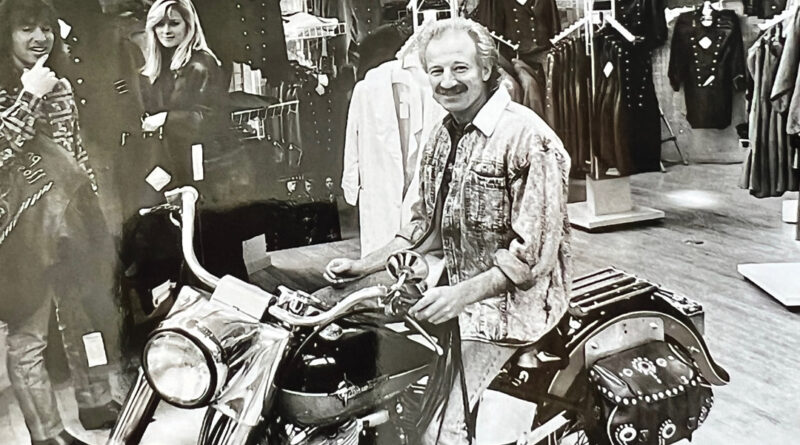No one knows Baltimore like Michael Olesker. And no one knows the legendary Leonard “Boogie” Weinglass like Michael Olesker.
A Jmore columnist and author of several books of local and national interest, Olesker recently came out with his latest offering, “Boogie: Life on a Merry-Go-Round” (Apprentice House Press). The biography chronicles the life and times of Weinglass, a Baltimore-born entrepreneur who made millions with his now-defunct Merry-Go-Round national clothing retail chain.
Written with the consent and cooperation of the 80-year-old Weinglass, “Boogie” traces his impoverished youth growing up as the son of immigrants in Northwest Baltimore and his life as a “Diner Guy,” as famously depicted in Barry Levinson’s classic 1982 film “Diner.”
Olesker recounts Weinglass’s meteoric success with the Forbes-ranked Merry-Go-Round, as well as his life as a hippie Florida playboy and committed philanthropist.
Jmore: Why did you decide to write a bio on Boogie?

Olesker: He is a classic American rags-to-riches story. He is a legendary Baltimore character who went on to become a legend through Merry-Go-Round across the country. They had 1,500 stores at one point — astonishing. And he has given away astonishing amounts of money, and gambled away astonishing amounts of money.
It’s just a classic story of somebody who grew up with nothing, created an empire and how his life played. I also felt like I wanted to write a book that reflected life in Baltimore in that era, including what it was like at places like Forest Park High School and City College and Knocko’s poolroom and Benny’s poolroom and the Hilltop Diner, and what the atmosphere was like back in those years when he was coming of age.
Did you know him back then?
I was actually at City College when Boogie was there. I hung out at the Hilltop Diner occasionally, although I was not cool enough to be one of the ‘Diner Guys.’ We have a few things in common, but what we did not have in common — and which distinguishes Boogie from so many other people in our generation — was that every instinct he had for courage and anarchy and for taking chances that teenagers had in their heads, he acted out. Sometimes this worked well for him, and sometimes not. But he was infinitely brave in taking chances all the time. In that sense, I admired him greatly and wished I could have been more like him.
In writing this book, what surprised you to learn about him?
I didn’t know his parents had gotten out of Europe just in time before the Holocaust really kicked in. I didn’t know he essentially grew up without a father. I didn’t know how little he had. I assumed he had been like most of the teenage guys back then who came from essentially intact working-class or middle-class Jewish families. In fact, he came from less, economically, and that had much to do with his outlook on the world.
How would you sum up his personality and character?
He’s a guy who has always taken the kind of chances most of us think about but never have the courage to actually take. Now that he has made it, he has chosen to give away so much of it. The generosity here is pretty breathtaking. To me, one of the themes of the book came from one of the first conversations I had with him. He said he had joined a country club here in Baltimore and there were always rich people there but they didn’t know how to enjoy their money. They were more interested in accumulating more of it and counting it.
One of the great stories to me was him standing in line at Lenny’s Deli and some stranger starts to tell him a hard luck story. Boogie calls his accountant and says, ‘Wire this guy $5,000 to get him out of trouble.’ Who does that? Well, he does!
What would you say was Boogie’s proudest moment?
He’ll joke about the fact that he still sees himself as a great streetfighter. He’ll talk about all the guys he punched out. But he’s enormously proud he put together this Merry-Go-Round company. He’s very proud he is still very much in touch with all three of his wives. And when I spoke with each of them, the two ex-wives and the current wife, they adore him still. And also he’s very proud of his children.
What takeaways would you like readers to get from this book?
That one of us, a local kid, grew up where nobody gave him a chance, whether it was teachers or guidance counselors or the guys around him. Nobody really thought he would make something of himself. He had the courage and energy and smarts to make something extraordinary out of his life and share it with others.
Among all of your books, which one are you proudest of?
That’s like asking parents which of their children they love the most. It warms my soul to think I’ve left a piece of me behind that culturally one day, long after I’m gone, somebody will pull off a library shelf and say, ‘So that’s what life was like in Baltimore in the 20th and 21st centuries, and that’s who some of these great characters were.’
On Thursday, May 19, from 6 to 7:30 p.m., Jmore hosted a book-signing event and conversation featuring Michael Olesker and Leonard “Boogie” Weinglass at The Ivy Bookshop, 5928 Falls Road. To view, visit jmoreliving.com/2022/05/19/michael-olesker-and-boogie-weinglass-share-stories-at-jmore-event-at-the-ivy-bookshop/.
Linda L. Esterson is a local freelance writer.





